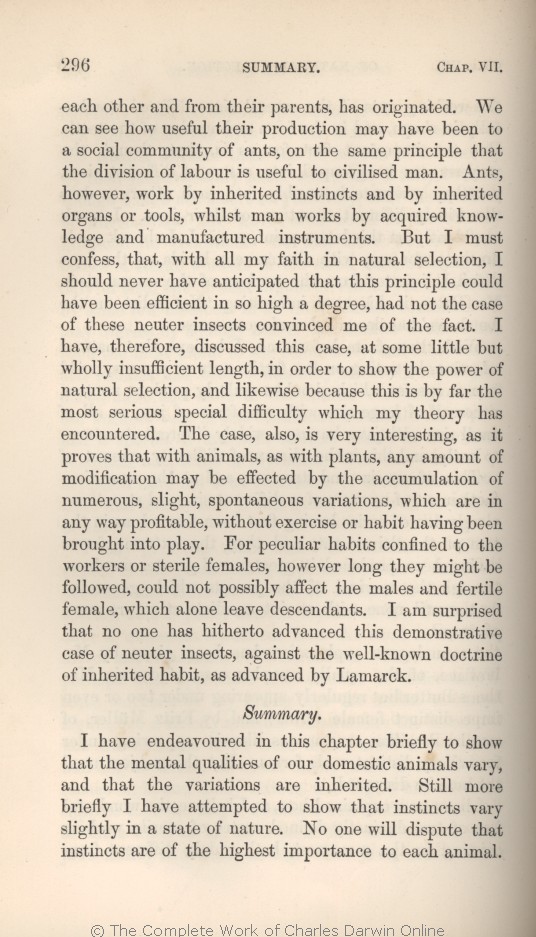their parents, has originated. We can see how useful their production may have been to a social community of
ants, | ants, 1866 1869 1872 | | insects, 1859 1860 1861 |
| Ants, however, 1866 1869 1872 | | As ants 1859 1860 1861 |
| organs 1860 1861 1866 1869 1872 | | tools 1859 |
| tools, whilst man works 1866 1869 1872 |
| weapons, and not 1859 |
| tools, and not 1860 1861 |
| instruments. 1866 1869 1872 | | instruments, 1859 1860 1861 |
| ..... 1866 1869 1872 | | a 1859 1860 1861 |
| ..... 1866 1869 1872 | | perfect 1859 1860 1861 |
| ..... 1866 1869 1872 | | division 1859 1860 1861 |
| ..... 1866 1869 1872 | | of 1859 1860 1861 |
| ..... 1866 1869 1872 | | labour 1859 1860 1861 |
| ..... 1866 1869 1872 | | could 1859 1860 1861 |
| ..... 1866 1869 1872 | | be 1859 1860 1861 |
| ..... 1866 1869 1872 | | effected 1859 1860 1861 |
| ..... 1866 1869 1872 | | with 1859 1860 1861 |
| ..... 1866 1869 1872 | | them 1859 1860 1861 |
| ..... 1866 1869 1872 | | only 1859 1860 1861 |
| ..... 1866 1869 1872 | | by 1859 1860 1861 |
| ..... 1866 1869 1872 | | the 1859 1860 1861 |
| ..... 1866 1869 1872 | | workers 1859 1860 1861 |
| ..... 1866 1869 1872 | | being 1859 1860 1861 |
| ..... 1866 1869 1872 | | sterile; 1859 1860 1861 |
| ..... 1866 1869 1872 | | for 1859 1860 1861 |
| ..... 1866 1869 1872 | | had 1859 1860 1861 |
| ..... 1866 1869 1872 | | they 1859 1860 1861 |
| ..... 1866 1869 1872 | | been 1859 1860 1861 |
| ..... 1866 1869 1872 | | fertile, 1859 1860 1861 |
| ..... 1866 1869 1872 | | they 1859 1860 1861 |
| ..... 1866 1869 1872 | | would 1859 1860 1861 |
| ..... 1866 1869 1872 | | have 1859 1860 1861 |
| ..... 1866 1869 1872 | | intercrossed, 1859 1860 1861 |
| ..... 1866 1869 1872 | | and 1859 1860 1861 |
| ..... 1866 1869 1872 | | their 1859 1860 1861 |
| ..... 1866 1869 1872 | | instincts 1859 1860 1861 |
| ..... 1866 1869 1872 | | and 1859 1860 1861 |
| ..... 1866 1869 1872 | | structure 1859 1860 1861 |
| ..... 1866 1869 1872 | | would 1859 1860 1861 |
| ..... 1866 1869 1872 | | have 1859 1860 1861 |
| ..... 1866 1869 1872 | | become 1859 1860 1861 |
| ..... 1866 1869 1872 | | blended. 1859 1860 1861 |
| 1 blocks not present in 1866 1869 1872; present in 1859 1860 1861 | | And nature has, as I believe, effected this admirable division of labour in the communities of ants, by the means of natural selection.
|
| must 1866 1869 1872 |
| am bound to 1859 1860 1861 |
| natural selection, 1866 1869 1872 | | this principle, 1859 1860 1861 |
| this principle 1866 1869 1872 | | natural selection 1859 1860 1861 |
| convinced 1859 1860 1861 1866 1869 | | led 1872 |
| of the fact. 1859 1860 1861 1866 1869 |
| to this conclusion. 1872 |
| difficulty 1866 1869 1872 | | difficulty, 1859 1860 1861 |
| may 1869 1872 |
| in structure can 1859 1860 1861 1866 |
| spontaneous 1869 1872 |
| and as we must call them accidental, 1859 1860 1861 |
| and spontaneous 1866 |
| way 1869 1872 | | manner 1859 1860 1861 1866 |
| been brought 1869 1872 | | come 1859 1860 1861 1866 |
| peculiar habits confined to the workers or sterile females, however long they might be followed, could not possibly 1869 1872 |
| no amount of exercise, or habit, or volition, in the utterly sterile members of a community could possibly have 1859 |
| no amount of exercise, or habit, or volition, in the utterly sterile members of a community could possibly 1860 1861 |
| no amount of exercise, or habit, or volition, in the utterly sterile members of a community, could possibly 1866 |
| affect 1860 1861 1866 1869 1872 | | affected 1859 |
| males and fertile female, 1869 |
| structure or instincts of the fertile members, 1859 1860 1861 1866 |
| males and fertile females, 1872 |
| hitherto advanced 1869 1872 | | advanced 1859 1860 1861 1866 |
| inherited habit, as advanced by Lamarck. 1869 1872 |
| Lamarck. 1859 1860 |
| inherited habit advanced by Lamarck. 1861 1866 |
|









